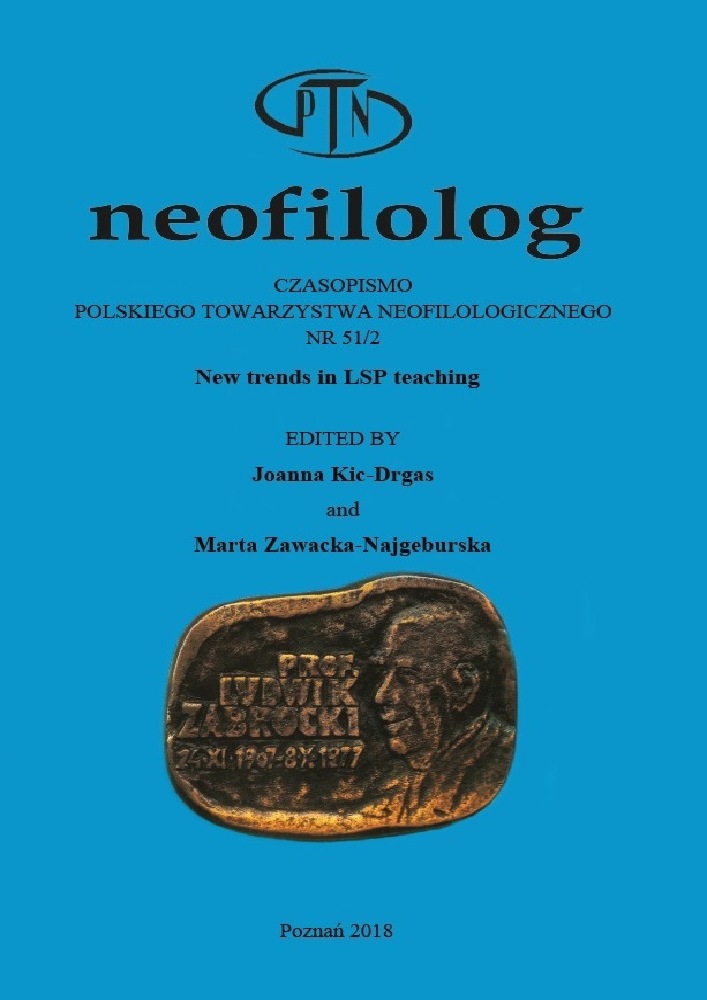Abstract
Not often do we encounter a specialized foreign language course at a university humanities department. However, why should foreign language students not be provided with practical knowledge which may be useful in future professional life? The article presents an experiment conducted with the participation of MA students of German studies at Warsaw University. The aim is to teach language skills, as well as convey professional knowledge in the CLIL formula, which is becoming more and more popular. It is consistent with requests of students themselves. Logistics is a useful introduction to various branches of the economy. Considering that the German language is becoming more and more important in business-related professions, the topics discussed in this course may be required in logistics, forwarding and other areas. In addition to traditional logistics topics, such as transport, storage and waste disposal, we also discuss topics such as business correspondence or negotiations and practice translations.
References
Buhlmann R., Fearns A. (2000), Handbuch des Fachsprachenunterrichts: Unter besonderer Berücksichtigung technischer Fachsprachen. Tübingen: Narr Studienbücher.
Fortmann K.M., Kallweit, A. (2000), Logistik. Klausur Intensiv Training BWL. Stuttgart: Kohlhammer Verlag.
Held M. (2015), Czego pragnie pracodawca? Czyli rzecz o wymaganiach wobec pracowników i kandydatów w dziedzinie języków obcych oraz umiejętności komunikacyjnych (in) Srebro M., Typek E., Zielińska L. (Hrsg.), Przyszłość nauczania języków obcych na uczelniach wyższych. Kraków: Uniwersytet Ekonomiczny, S. 71-80.
Fluck H-R. (1998), Fachsprachen und Fachkommunikation. Heidelberg: Gross.
Gajewska E., Sowa M. (2014), LSP, FOS, Fachsprache..., Dydaktyka języków specjalistycznych. Lublin: Werset.
Parczewski P. (2015), Dekonstrukcja Krajowych Ram Kwalifikacji – krytyczna analiza wpływu Krajowych Ram Kwalifikacji na poprawę jakości nauczanai języków obcych w polskich szkołach wyższych (in) Srebro M., Typek E., Zielińska L. (Hrsg.). Przyszłość nauczania języków obcych na uczelniach wyższych. Kraków: Uniwersytet Ekonomiczny, S. 81-96.
Sowa M. (2015), Ewolucja programu kształcenia na filologii romańskiej w swietle wyzwań rynku pracy i Krajowych Ram Kwalifikacji (in) Srebro M., Typek E., Zielińska L. (Hrsg.). Przyszłość nauczania języków obcych na uczelniach wyższych. Kraków: Uniwersytet Ekonomiczny, S.111-122.
Strzelecka G. (2015), Wirtschaftsdeutsch für Germanistikstudenten: eine Gratwanderung zwischen Praxis und Ideal (in) Srebro M., Typek E., Zielińska L. (Hrsg.), Przyszłość nauczania języków obcych na uczelniach wyższych. Kraków: Uniwersytet Ekonomiczny, S.123–124.
Strzelecka G. (2017), Wirtschaftsdeutsch für Germanistikstudenten: Peripherie oder ein Zeichen der Zeit? Einige Erwägungen zu den Bereichen Touristik und Logistik (in) Janikova V., Nalepova J. (Hrsg.), Zentrum und Peripherie. Aus Fremdsprachendidaktischer Sicht. Opava: Slezska univerzita v Opavê, S.141–156.
Strzelecka G. (2018), Wozu brauchen wir die Logistik? Einige Überlegungen zum Fachsprachenunterricht (in) Krawiec M., Pitchard R. (Hrsg.), Seize the Day: new perspectives on Foreign Language Learning and teaching. Hamburg: Verlag Dr. Kovač (im Druck).
Strzelecka G., Suszczyńska R. (2016), Język niemiecki zawodowy w logistyce i spedycji, Warszawa: Wydawnictwa Szkolne i Pedagogiczne.
Suszczyńska R. (2018), Das Lehrbuch „Fachsprache Deutsch in Logistik und Spedition“ – eine kommentierte Besprechung (in) Krawiec M., Pitchard P. (Hrsg.) Seize the Day: new perspectives on Foreign Language Learning and teaching, Hamburg: Verlag Dr. Kovač (im Druck).
Zielińska L. (2015), Content and Language Integrated Learning approach in Teaching Foreign Languages at the University Level (in) Srebro M., Typek E., Zielińska L. (Hrsg.) Przyszłość nauczania języków obcych na uczelniach wyższych. Uniwersytet Ekonomiczny, S. 53-68.
Internetquellen
www.bvl.de (letzter Zugriff: 2.01.2017)
www.absolventa.de (letzter Zugriff: 4.01.2017).
License
Copyright (c) 2018 Neofilolog

This work is licensed under a Creative Commons Attribution-NoDerivatives 4.0 International License.
Authors
Authors of texts accepted for publication in Neofilolog are required to complete, sign and return to the Editorial team’s office the Agreement for granting a royalty-free license to works with a commitment to grant a CC sub-license.
Under the agreement, the authors of the texts published in Neofilolog grant Adam Mickiewicz University in Poznań a non-exclusive, royalty-free license and authorize the use of Attribution-NoDerivatives 4.0 International (CC BY-ND 4.0) Creative Commons sub-license.
The authors retain the right to the free disposal of the work.
Users
Interested Internet users are entitled to use works that have been published in Neofilolog since 2017, under the following conditions:
▪ attribution – obligation to provide, together with the distributed work, information about the authorship, title, source (link to the original work, DOI) and the license itself.
▪ no derivatives – the work must be preserved in its original form. Without the author's consent, it is not possible to distribute the modified work in the form of translations, publications, etc.
Copyrights are reserved for all texts published since 2017.
Miscellaneous
Adam Mickiewicz University in Poznań retains the property right as a whole (layout, graphic form, title, cover design, logo etc.).

